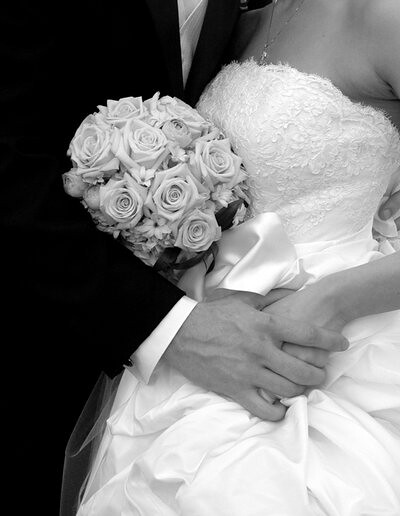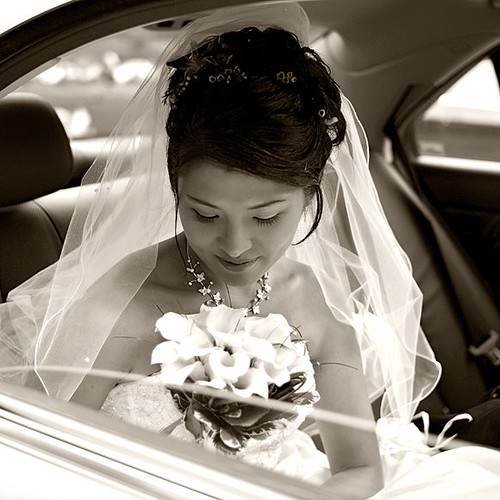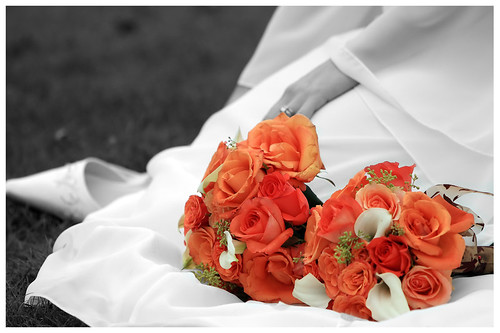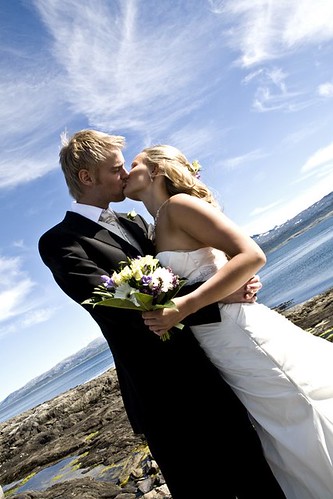Contrary to what they say in the magazines and on-line now, you don't have to spend a fortune to have a wonderful, memorable wedding. The most important part of making a wedding memorable is focusing on and prioritizing what you want to achieve. Fortunately, that same focus will help you save money as well!
You can look at all the planning guidelines and timelines in magazines and on websites for ideas of things you might do, but don't get boxed in by them. Real weddings come together in a much different way than magazines and many experts suggest.
You and your fiancé need to sit down and really talk and think about what you want MOST for the wedding. A certain location, a large guest list, great photography, a really fancy gown and accessories. Start making notes of what you really want and what you can live without. Compare your ideas, and compromise when necessary, to come up with a wedding you'll both love.
When you have an idea of what's most important to you, you can start finding out what those things will cost. Call around, ask around, make notes, add things up. Then when you have an idea of what you'll do, start with the most important priorities FIRST, so you make sure you can afford them. Then you can compromise on, or even omit, some of the less important things as your budget gets stretched.
The following is a compilation of ideas sent to various brides who were looking to keep their expenses and/or weddings small, but memorable.
General Budget/Cash Flow Issues
- Careful timing can reduce reception costs. Do you have a time set for the wedding? If you don't want to spend a lot on refreshments, plan the wedding and reception at a time other than mealtime.
Usually, for instance, it's tough to have a morning wedding early enough to avoid feeding the guests lunch. Even a very short ceremony and reception that starts at 10 am is going to run into "lunchtime" (and some guests may expect brunch, since many morning weddings offer that.)
In the afternoon, you could plan the wedding to start, say, 1:30 or 2 pm, and figure you can have people on their way before 5 if there are no real activities except socializing and limited light refreshments.
In the evening, you can work it the same way, if you wish. Any ceremony after about 6:30 pm (or certainly 7) would be "after dinner" (in most regions), so you could plan to only serve dessert rather than a buffet or meal.
- Make some things for the wedding yourself. Doing-it-yourself is not always as much cheaper as it used to be, but it still saves you labor charges, if you have creative talents and energy. It is encouraged that couples and families to make garters or bridesmaids dresses, arrange flowers, cook the reception food, whatever they are good at. It's cheaper, and it's often more meaningful to have had a hand in the preparations personally. Also, many family and friends really ENJOY helping out with wedding prep. Don't be afraid to ask! : )
- Consider marrying on Friday evening. This is NOT the most convenient arrangement, because people have to get out of work early, etc. It can also be difficult for any out-of-town guests you might have, because it may force them to take an additional day off work to arrive in time for all the festivities. But you can sometimes get discounts on sites and services. If you are *really* tight in the budget, this could be an option worth researching.
- One other Very Important thing to remember when money is tight. Most of your bills will come due right before the wedding. Usually you pay 1/2 up-front for services, and then the last couple weeks before the wedding, everyone wants their other half paid. BE PREPARED FOR THIS! Try to look ahead so you will have the cash flow you need when all those payments go out at once. If you can, save extra Right Away while you are in the early planning stages, because you will need it later.
- Also, plan your budget Smaller than you think you could really afford. If your wedding expenses come within that figure, that will be great. But if one or two things turn out to be more expensive than you expected, you won't be right at the absolute limit of your funds. It will give you peace of mind.
Location/Guest List
- Keep your guest list small. The more people, the bigger the location, the more food, the more invitations, etc.
- Have the wedding and reception in the same place. It's trendy to have them separate locations, but frankly, as a guest, I really dislike the practice (all that extra driving and parking). And from the couple's standpoint, it's much cheaper to do it all in one place. It's also more convenient and relaxing for everyone involved.
- Consider an less-traditional location. In most areas, many attractive locations are willing to have weddings. Not just the churches, hotels and country clubs where most weddings take place. Some non-traditional locations will cost you more, but others may cost Considerably less. So do some research, and make some calls. Likely locations include, parks (local, state and national), bed-and-breakfasts, country inns, restaurants, public gardens, historic homes or monuments, museums, galleries, and private homes of friends or family.
When considering the suitability of any location, be sure to find out not just about the price to rent the location, but also about parking, seating, restrooms, food preparation and/or storage, dressing areas, security, electrical hook-ups, restrictions or regulations (on alcohol, attire, photography or videography, decorations, etc.) Anything not provided or conveniently available may cost you more to rent or provide on your own.
Attire
- The two best ways to save money on attire are to dress very casually, or to sew your own (or have a friend or relative sew your) gown and/or bridesmaids' gowns. But even casual gowns can be quite costly in the current market, unless you are able to take advantage of sales or other discounts.
Home-sewn gowns are less popular now than they were in the 70's and 80's. However, since the current styles and fabrics are actually fairly easy to sew, it seems a shame that more brides and their families do not make use of this option, especially for bridesmaids and flowergirls.
Obviously, good general sewing skills and a dependable sewing machine are necessary, as well as a reasonable "eye" for fitting. But if you consider that a bride recently commented that she was happy to find a flowergirl dress for only 2 times lesser than usual (other similar gowns were as much as RM450), it seems clear that sewing should be an option budget-conscious brides at least consider.
- Headpieces and some accessories are very inexpensive to make, as well. Good instructions are available in books and with patterns. If you are creative at all, you might look into this option. Mark-ups on headpieces, especially, are VERY high in most bridal boutiques, so this can net you a big savings from retail.
- If you will buy your gown "off-the-rack", big discount bridal stores and on-line resources can offer lower prices but consider what you may, or may not, get from these sources in the way of quality, personal service, dependability, selection, alterations, etc. Some are excellent; others are not. Working with a company or resource you have personal references for is the best, whenever possible.
- If you will hire a dressmaker to save money, remember that the talents and prices and quality provided will vary considerably. You might be fortunate to have a very inexpensive, but fabulously talented dressmaker available to you. On the other hand, to get the best deal from a more expensive dressmaker or designer, you might decide to simplify your fabric and detailing choices to include only what's MOST important to you. The other advantage of having a gown made is that, at least you will not have to worry about alterations costs on top of the purchase price.
- Menswear costs can be reduced by having the men wear suits they own, for example, rather than renting matching formalwear.
Decorations/Flowers
- If you will use fresh flowers, try to choose varieties which will be in-season at the time of your wedding date. Skip extra arrangements on the altars, reception tables, etc. If you must decorate these areas, consider using inexpensive live plants (home centers, discount stores, large nurseries, and even grocery stores sometimes have great prices on potted plants.) Be sure, however, that any plants or flowers used near food are not toxic.
- Keep the bouquets small. Let the bouquets do double-duty for decoration, by laying them out on your tables at the reception. Consider eliminating corsages and boutonnieres for anyone besides your own and your fiancé's parents.
- Consider arranging silk or dried flowers yourself. The price of professionally-arranged silk or dried bouquets is often about the same as fresh flower prices. However, if you use careful shopping, creative filler options, a bit of patience, and some ingenuity, you can often save money by arranging silk or dried flowers yourself. If you haven't worked with floral arranging before, start with the boutonnieres. They are easy to handle and help you get familiar with the general techniques and products you will use on the larger arrangements.
- Not all locations need extra decorations. It is not necessary to totally transform your ceremony or reception location in order to have a beautiful and memorable wedding. If your budget is tight, do the minimum you are comfortable with.
- If you really need some color and interest in a really boring reception location (a common problem), I have seen really pretty, classy effects achieved with really simple, inexpensive party materials, like balloons, streamers (especially metallic or pearlized), honeycomb wedding bells, inexpensive fabrics, candles, confetti and glitter.
If you choose to use materials like these, choose your colors carefully so they are not too harsh, and look for ways to combine materials and add small decorative details (silk flowers, ribbons, floating beads, etc.) to create a more complex, customized look.
Refreshments
- Your choice of refreshments is very important to how much the reception will cost.
Generally, the least expensive reception is a cake and punch reception. Cake is really the minimum food you should serve. You can cut cake costs, if necessary, by having a very small decorative and/or stacked cake, and supplementing the servings with additional sheet cake in the same flavor. Punch is an easy and inexpensive beverage, and it can be very fun to make.
A cake and punch reception usually also includes coffee and perhaps tea, individual sodas instead of punch if you prefer (but that costs more), and sometimes champagne or other alcohol (but that's a pricey item, too.) There has also recently been a trend toward offering other desserts besides cake, so you could have a "dessert and punch" reception for a little more than a standard cake and punch affair.
A pot-luck is next most expensive, because it should be assumed that you and your family will contribute several dishes. In some social circles, this works out very well, and makes for a very fun and tasty reception. There is a lot of variety in the food (something for everyone, usually) and even if some guests are not able/willing to bring something, there's usually plenty. This sort of arrangement works well for family- or church-oriented weddings, where guests feel that bringing a dish is a way to help the couple celebrate. In other circles, guests may consider this in poor taste, feeling that the bride's (and perhaps groom's family) should be treating the guests to a meal. You would have to check around with family and friends to see how they would feel about this idea.
Some hosting families opt to prepare the food themselves. It gives them control over the cost and menu, but eliminates the potluck concept of asking others to bring something. If you have a lot of guests, you could also ask for help from the bridal party members and your closest family and friends.
Cold food works the best for this because you can buy and prepare it ahead. If you have family or friends willing to help, it's not too taxing to have them each make a double or triple recipe of one dish like potato or crab salad, or a platter of cold cuts, or a tray of rolls. Warehouse and food service stores like Price Club and Smart and Final have made this even easier, providing good prices for large quantities, and (at Smart and Final and other restaurant suppliers), low cost serving dishes and utensils as well. I have found that big plastic punch bowls are excellent for serving salads and other large dishes attractively and economically.
Of Catered options, prices would range from purchasing trays at a supermarket or other deli, to having a restaurant or caterer provide trays or a simple buffet, to having a formal sit-down dinner cooked by the kitchen at the reception site or a private caterer, to really elaborate, multi-course banquets.
Entertainment
- Providing entertainment or activities costs extra, generally. If you want to keep the reception low-key, skip or at least limit music and dancing (this will also save you from having to rent a dance floor). If you have access to a small sound system, at the location or through a friend, you can supply your own background music through CDs or cassettes.
You may or may not need a microphone at all, depending on what you choose to include in the way of toasts and announcements. If you keep it really informal, just a chance to chat with guests, you can get away with almost no extra equipment or related preparation. This will also tend to keep the reception short, since guests won't be staying late to dance and party.
Professionals
- Hiring professionals, of course, accounts for a great chunk of many wedding budgets. As a professional myself, and speaking for the many fine wedding professionals this is often money very well spent. However, people have married without the help of professional dressmakers, florists, caterers, photographers, videographers, musicians, and event planners for hundreds of years. And some couples still do.
If your budget is really tight, pick your professionals with care. Personally, photography is the most important professional priority (see article); and many couples have felt the same. For you, it might be a particular florist or caterer. But remember you do not have to hire every professional suggested in the bridal magazines, or by people you know. You can choose to spend the money you have on what matters most to you.
- Consultants, coordinators and event planners are currently touted by most magazines, and many bridal advisors, as an *essential* element of modern wedding planning. They site money savings, higher quality wedding "results", planning-stress reduction, and more. It is important to point out, however, that many, if not most, weddings are planned without the help of this type of professional. And most of them are beautiful, happy, fun and memorable.
There are situations where a bridal consultant, coordinator or event planner is very helpful-- and still another few situations where one might be essential. But if you are planning a relatively average wedding, and you are concerned with keeping costs down, this is a professional I believe you can safely skip no matter what the magazines say.
Good advice and information about wedding planning is available from many free or inexpensive sources-- friends and family, your local library, the internet, and many of the wedding professionals with whom you will be working. Don't sell any of these resources short!
And don't let anyone intimidate you by making wedding planning seem more complicated than it is. A lot of the people who emphasize the stresses, costs, and frustrations of planning are either selling something, or they have been heavily influenced by those who are.
LOTS of couples plan wonderful weddings without suffering tremendous stress, without going into years of debt, without having horrible fights with their future spouses-- and without losing sight of the reason they are doing all of this in the first place. You can, too! Best wishes to you!!
![[jane] dimplemaggot.blogspot.com](https://blogger.googleusercontent.com/img/b/R29vZ2xl/AVvXsEjtfuQmzJ5LSHce-ZblliBqlWbqOsi-notSfXJeWyTMzDdlphB3xVwWRya6KsOmGJslV-ItxYwazEl1yy8uULJHmvgll95I4rifDVoC9yQ2qmae81GDljeMnBmHZBRYGy6Xo79EgiRZKfg/s1600/dm-header.png)




No comments:
Post a Comment